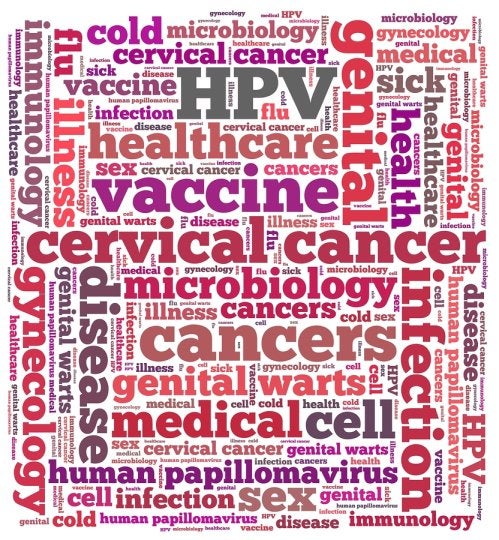-
Inform Yourself about HPV
Human papillomavirus, or HPV, affects at least half of sexually active people. There are over 100 different strains of the virus, and while some clear up on their own without causing symptoms or complications, others are linked to cancer. Your gynecologist can determine if you are at risk for HPV and i`f you need to be tested for the virus. Here are the facts you need to know.

How Does HPV Spread?
HPV is spread through sexual contact. You can catch it by coming into contact with the genital skin, mucous membranes, or bodily fluids of an infected person during sexual intercourse or oral sex. HPV generally doesn’t cause any symptoms, so you usually cannot tell if someone has it by looking at them; many people who are infected don’t know that they carry the virus. The only visible symptom of HPV is genital warts, which may appear alone or in clusters.
How Is HPV Diagnosed?
Many cases of HPV go undiagnosed because they clear up on their own without causing any symptoms. If genital warts are present, your gynecologist can diagnose HPV with a visual exam. In some cases, your gynecologist may recommend an HPV test, which can be performed during your Pap smear. HPV tests are usually not recommended for women under 30 unless there is a reason, such as an abnormal Pap test result.
How Can I Reduce My Risk of Getting HPV?
Abstaining from sexual contact is the only way to completely avoid HPV. You can reduce your risk of contracting it by using a condom and limiting your number of sexual partners. Choosing sexual partners who have also limited their own number of partners in the past will also reduce your risk.
If you are concerned about HPV, make an appointment at Washington Surgi-Clinic. We provide gynecology services near Washington, DC, including STD testing . You can schedule an appointment now by calling (202) 659-9403.
-
A Woman’s Guide to Terminating a Pregnancy
If you are considering terminating a pregnancy , arming yourself with the facts will help you make the right choice for you. Your gynecologist can discuss pregnancy termination services with you and answer questions you may have. This information will also help you understand what to expect on the day of your abortion.

Medical Abortion
Medical abortion involves taking two pills. The first pill – often a medication called mifepristone—is usually taken while you are at the doctor’s office. Six to 72 hours after the first pill, a second one—misoprostol—is taken at home. This pill must be either dissolved inside your cheek or placed vaginally, depending on the doctor’s instructions. About one to four hours after the second pill is taken, the abortion will begin. Heavy bleeding and some cramping are common and may persist for several hours. Medical abortion is an option for women up to 10 weeks after the first day of their last period.
Aspiration Abortion
Aspiration abortion is performed in a gynecology office. During this procedure, a doctor will terminate the pregnancy using instruments inserted into the uterus via the vagina. The procedure takes about five to 10 minutes. Pain medication can be used to manage cramping that occurs during and after the procedure. Light bleeding is possible for up to one week. Aspiration abortion is available for women up to 12 weeks after the first day of their last period.
Both medical and aspiration abortions are between 98 and 99 percent effective. The right one for you depends on several factors, including how far along in your pregnancy you are. You can work with your doctor to evaluate your preferences and needs. At Washington Surgi-Clinic, we provide first and second-trimester abortion in Washington, DC, as well as a range of gynecological services , including STD testing and morning-after pills. To make an appointment, please call (202) 659-9403.
-
Comparing Surgical and Chemical Abortions
Pregnancy termination may be either chemical or surgical. In Washington, D.C., chemical abortions are only available through six weeks gestation by menstrual age. Also known as medical abortions, chemical pregnancy termination involves taking mifepristone and misoprostol, which are two medications that cause the uterine lining to break down and then to be expelled as with a normal period. Chemical abortions are non-invasive, although they can cause cramping, bleeding, and dizziness. Women who had a chemical abortion are asked to return to a gynecologist for a follow-up visit to ensure the completion of pregnancy termination.

In contrast, surgical abortion is available up to 26 weeks of pregnancy in Washington, D.C. Although it is an invasive procedure, patients can choose from local anesthetic, light sedation, or general anesthesia. During a surgical abortion, the gynecologist will gently remove the contents of the uterus through the vagina. Both surgical and chemical abortions are safe for women, with only a low risk of complications.
Washington Surgi-Clinic performs safe and legal chemical and surgical abortions , along with a full range of other gynecology services such as STD testing, HPV treatment, and Pap smears. You can call (202) 659-9403 to inquire about confidential pregnancy termination near Washington, D.C.
-
Choosing the Right Birth Control for You
Some women are able to find the right birth control pill after just one visit to a gynecologist. For many women; however, it can take some trial and error. This is because every woman’s needs and preferences are unique; what works well for one woman may not necessarily work well for another.
Before you visit your gynecologist, consider researching your options and watching this brief interview with a gynecologist. She discusses the importance of finding an ideal balance of progesterone and estrogen.
For help finding the right birth control pill for you, you can turn to Washington Surgi-Clinic – a leading provider of gynecology services near Washington, D.C. Call (202) 659-9403 to schedule an appointment with a gynecologist for birth control, STD testing, or vaginal infection treatment.
-
What Women with HPV Should Know
The human papilloma virus (HPV) includes over 150 different virus types, more than 40 of which can infect the genital region. HPV is a very common type of sexually transmitted infection (STI) that may be transmitted through oral, vaginal, or anal intercourse. Having HPV can be associated with a higher risk of cervical cancer. If you have tested positive for HPV, your gynecologist can help you understand its possible effects on your health and your HPV treatment options.

Normal Monitoring
An HPV infection doesn’t always require treatment. If you tested positive for HPV, yet your Pap smear was normal, your gynecologist may recommend having these tests again in one year. Quite often, women who test again in 12 months do not show signs of pre-cancerous changes or HPV. If this is the case for you, your gynecologist may instruct you to resume your normal testing schedule.
Additional Testing
If you tested positive for HPV and your Pap test results were abnormal, your gynecologist may recommend that you undergo additional tests. Your doctor may perform a colposcopy, which allows him or her to examine the cervix through magnification. Your doctor might also recommend a tissue biopsy. Depending on the results of the additional tests, you may be referred to a gynecologic oncologist.
HPV Treatment
It is not possible to treat the virus itself, as there is no cure. However, a gynecologist can recommend treatment options for problems caused by the virus . Your gynecologist can treat genital warts, for example. He or she might also recommend the removal of the abnormal cervical cells to prevent them from becoming cancerous later on. Your gynecologist may remove these cells during a colposcopy. Other methods of removing abnormal cells include cryotherapy and loop electrosurgical excision procedures (LEEP).
For HPV treatment in Washington, D.C., women can rely on the compassionate gynecology team at Washington Surgi-Clinic. Our gynecology practice provides comprehensive well-woman services, including first and second trimester abortion options, STD testing, and Pap smears. Call (202) 659-9403 for an appointment.
-
Answers to Your Questions About Pap Tests
A Pap test, also known as a Pap smear , is an important health screening for women. A gynecologist can perform Pap smears to check for the presence of abnormal cells in the cervix, which is the lowest part of the uterus. These abnormal cells may later become cancerous unless treated.

Do I Really Need a Pap Test?
The early stages of cervical cancer may not necessarily cause symptoms. However, detecting cancer or identifying pre-cancerous changes as early as possible is crucial for a favorable outcome. By having regularly scheduled Pap tests, you can boost your chances of detecting this deadly disease as early as possible. However, some women may not need to have Pap tests any longer. These include women who have undergone a hysterectomy to remove the cervix and uterus, provided they do not have a history of abnormal Pap smears or cervical cancer. A gynecologist may also inform a woman that she no longer needs Pap smears if she is 65 years or older, has had three normal and consecutive Pap tests, and has not had any abnormal results within the past decade.
How Often Should I Have a Pap Smear?
Your gynecologist can let you know how often you should have a Pap smear. Most women who are between 21 and 29 years old should receive a Pap test every three years. Women between 30 and 64 may have a Pap test every three years by itself or they can have a Pap test and HPV test together every five years.
Are There Any Scheduling Considerations?
Try to schedule your Pap test 10 to 20 days after you first begin your period. If your period is irregular and you begin bleeding close to your appointment date, you can reschedule your appointment with the gynecologist. To facilitate accurate test results, refrain from certain activities for two days prior to your appointment. These activities are using tampons, douching, having sex, using vaginal suppositories or creams, and using vaginal deodorant products.
Washington Surgi-Clinic continues its mission of providing safe, compassionate, and confidential women’s wellness services since our founding in 1973. Women can have a Pap smear in Washington, D.C. by appointment at our gynecology clinic. Call (202) 659-9403 or visit our website to read about our other gynecology services, including morning after pills and HPV treatment.
-
When to Get a Routine Pap
Cervical cancer is often a preventable disease. Your gynecologist can perform a Pap test, which checks your cervix for abnormal cellular changes that may lead to cervical cancer. This allows your gynecologist to recommend early treatment before the abnormality becomes cancerous. Even if you are not sexually active, your gynecologist is likely to recommend that you get a Pap test if you are between the ages of 21 and 65. Your doctor can also provide recommendations on how often to get a Pap smear. Some women might have this test every year, while others might only have it every three years.

Certain women may no longer need a Pap test. Your gynecologist might inform you that you do not need this test if you underwent a hysterectomy for reasons other than reproductive cancer and your cervix was removed. Women who are 65 or older who have not had abnormal test results in the past 10 years may no longer need to have this test.
Washington Surgi-Clinic, a center for gynecology in Washington, D.C., provides a full range of well-woman healthcare services , including Pap smears. Call us at (202) 659-9403 or visit us online to read about our commitment to patient confidentiality.
-
The Benefits of Birth Control
Gynecology services include birth control, such as the pill, injection, patch, and intrauterine device (IUD). While the most obvious reason to use birth control is to prevent an unwanted pregnancy, you may be surprised to learn that there are other health benefits. For example, the birth control pill can significantly reduce your risk of developing ovarian and endometrial cancers. It can also provide relief of PMS symptoms.
When you watch this video, you’ll hear a gynecologist describe some of the other benefits of using birth control. She explains the pill’s effect on your periods and describes how it can even improve the appearance of your skin.
Are you exploring birth control methods , looking for STD testing services, or thinking about pregnancy termination? For complete gynecology services near Washington, D.C., you can call Washington Surgi-Clinic at (202) 659-9403.
-
Reducing Your Risk of Cervical Cancer
The cervix is the lower part of your uterus, above the vagina. The endocervix is the section of the cervix that is near the uterus and the part of the cervix next to the vagina is the exocervix. The transformation zone is the place at which the main cells of the endocervix (glandular cells) and the main cells of the exocervix (squamous cells) meet each other. Most types of cervical cancers originate in this transformation zone. However, cervical cancer doesn’t begin suddenly. Your gynecologist can detect pre-cancerous changes of the cervical cells, such as dysplasia and cervical intraepithelial neoplasia. You could also consult your gynecologist about ways of reducing your risk of cervical cancer.

Have Regular Pap Tests
A Pap smear is a sample of cells from your cervix that is analyzed in a lab. The results of the Pap test may indicate whether you could have abnormal changes of the cervix that may lead to cervical cancer. If your Pap test results are normal, your chances of developing cervical cancer in the near future are low. If your test results are abnormal, your gynecologist may recommend monitoring or treating the potentially pre-cancerous changes.
Get Vaccinated
The human papilloma virus (HPV) is a significant risk factor of cervical cancer . There are vaccines available that can protect you from acquiring the HPV strains that can cause cancers of the cervix, vulva, and vagina. Since the HPV vaccine is only recommended for individuals of a certain age, it’s important to speak with your gynecologist about getting vaccinated as soon as possible.
Practice Safe Sex
In addition to receiving the HPV vaccine, you can reduce your risk of acquiring HPV by practicing safe sex. Always use a condom even if you take birth control pills. Limiting your number of sexual partners and avoiding having sex at an early age are other steps that may reduce your risk.
Avoid Smoking
Smoking can increase your risk of squamous cell cervical cancer. If you smoke and you would like to quit, a healthcare provider can help you.
The gynecologists at Washington Surgi-Clinic are your partners in well-woman care. Our providers of compassionate gynecology services near Washington, D.C. offer extensive patient education to help women take control of their wellness. Give us a call at (202) 659-9403 if you would like to schedule an appointment for STD testing, HPV treatment, or other gynecology services.
-
What to Expect from a Pap Test
If you’ve scheduled your first Pap smear at a gynecologist’s office, you’re taking an important step toward safeguarding your health. Pap tests allow your gynecologist to check for abnormal changes of the cervix, some of which may lead to cervical cancer. It’s perfectly normal to experience a little anxiety about having a Pap smear. However, staying relaxed and easing muscle tension in your lower body can make the test proceed more quickly.

Preparing for Your Appointment
When you call the gynecology office to schedule the Pap test, be sure to choose a date on which you do not expect to have your period. It’s generally best to schedule the test 10 to 20 days after the first day of your period. During the two days prior to your appointment, you should avoid certain things that may interfere with the results of your test. This includes using tampons, vaginal deodorant sprays or powders, vaginal creams, and vaginal suppositories. You should also avoid douching and having sex.
Undergoing the Exam
At the gynecology office, you’ll have privacy while you disrobe and put on a hospital gown. Then, you’ll sit on the edge of the exam table, place your feet in the stirrups, and lie back on the table. You’ll be asked to separate your legs and to relax your muscles. Some women may experience some minor discomfort during the exam. It can be helpful to take deep, steady breaths. Your gynecologist will examine your external genitalia before gently inserting a speculum. This device widens the opening so that the gynecologist can examine the cervix and vaginal walls. Then, the gynecologist uses other medical tools to collect a sample of cervical cells. After the provider collects the sample and removes the medical devices, he or she performs a manual internal examination. The gynecologist inserts two fingers into the vagina and places the other hand on your abdomen. This allows your gynecologist to check for any abnormalities in the pelvic region.
If you have any questions about your upcoming appointment at Washington Surgi-Clinic , you can call us at (202) 659-9403. Our state-of-the-art medical facility provides an unparalleled level of professional and courteous personal care for women. In addition to annual Pap tests and pelvic exams, our gynecology team provides STD testing, morning after pills, and pregnancy termination near Washington, D.C.
Recent Posts
Popular Posts
categories
- Uncategorized
- STD
- Washington Surgi-Clinic
- Abortion
- Pregnancy
- Pap Smears
- Birth Control Options
- HPV
- Gynecologist
- Pregnancy Test
- Abortion Safety
- IUD
- Pregnancy Termination
- First Trimister
- Cervical Cancer
- Morning After Pill
- Birth Control Pills
- Chlamydia
- Birth Control Shot
- Gonorrhea
- STD Testing
- Birth Control Implant
- Pelvic Pain
- Birth Control Patch
- HIV
- HPV Vaccine
